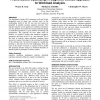Free Online Productivity Tools
i2Speak
i2Symbol
i2OCR
iTex2Img
iWeb2Print
iWeb2Shot
i2Type
iPdf2Split
iPdf2Merge
i2Bopomofo
i2Arabic
i2Style
i2Image
i2PDF
iLatex2Rtf
Sci2ools
131
click to vote
CHI
2005
ACM
2005
ACM
Profile before optimizing: a cognitive metrics approach to workload analysis
The Intelligence Analyst (IA) community will soon be the designated users of many new software tools. In the multitasking world of the IA, any one tool cannot be permitted to greedily consume cognitive resources. This situation requires a new approach to usability assessment; one that profiles the moment-by-moment demands placed on embodied cognition by a given software tool during task performance. The approach we have taken relies on families of cognitive models that interleave cognition, perception, and action at the 1/3 to 3 sec timescale. This is the level of analysis where embodied cognition forms interactive routines that adapt to the cost-benefit structure of the software tool. Our proof-of-concept is a model that performs a task that the IAs find challenging. From the trace of the model, we derive a cognitive metrics profile that pinpoints dynamic changes in workload demands on human cognitive, perceptual, or action systems. Author Keywords cognitive modeling, intelligence an...
CHI 2005 | Cognitive Metrics | Embodied Cognition | Human Computer Interaction | Keywords Cognitive Modeling |
| Added | 30 Nov 2009 |
| Updated | 30 Nov 2009 |
| Type | Conference |
| Year | 2005 |
| Where | CHI |
| Authors | Wayne D. Gray, Michael J. Schoelles, Christopher W. Myers |
Comments (0)

